Malcolm Prior,BBC News rural affairs producer
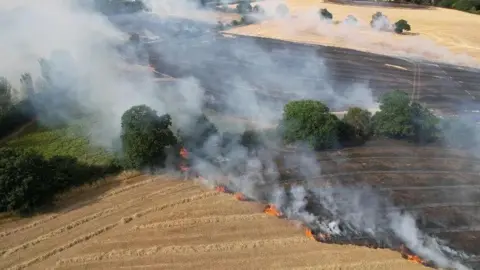 Getty Images
Getty ImagesVital equipment used by firefighters to tackle environmental disasters and terror attacks needs to be “urgently” replaced at an estimated cost of £100m, the BBC has learnt.
The specialist hardware – used in national emergencies and first introduced to the UK after the 9/11 attacks in the US – is now more than 20 years old and at the end of its life.
A project to replace the kit was started three years ago but firefighters say they still do not have the modern pumps best suited to deal with large-scale wildfires.
The Home Office said it was currently reviewing the UK’s “national resilience assets”.
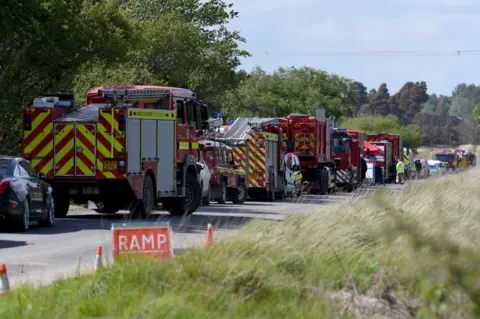 Getty Images
Getty ImagesThe Fire Brigades Union (FBU) said the need to renew that equipment was “urgent” and should not “wait until the next crisis hits”.
First brought in as part of the post-9/11 New Dimension project, it includes mass decontamination units, urban search and rescue kit, flood response boats and large high-volume pumps capable of pumping thousands of litres of water a minute.
Full details of how much specialist kit the UK has are kept secret for security reasons. It is paid for by central government but owned by individual fire services and kept in strategic locations to be deployed across the country in larger-scale emergencies.
In recent years, it has been used more and more often to deal with natural disasters linked to extreme weather events, such as the summer wildfires of 2022 and the floods of 2007.
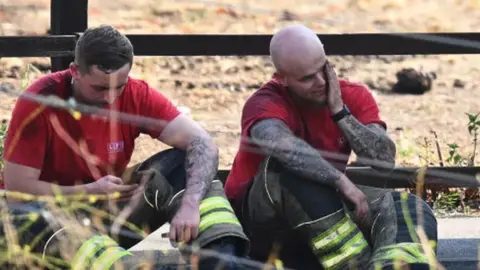 Leon Neal
Leon NealIt includes more than 50 high-volume pumps originally designed for use in flooding but which now also need to be deployed to wildfires.
They need to be replaced by smaller modern pods that can be more easily transported by “prime mover” vehicles to remote wildfire locations across the countryside.
It is thought the new pumps needed will not be in service for up to two years but fire chiefs say that, while the existing pumps are at the end of their life, they are not failing.
The National Fire Chiefs Council (NFCC) has estimated the full cost of replacing all the New Dimension kit would be £100m.
But a spokesman told the BBC it was “exactly that, an estimate” and that an ongoing review of what capabilities and equipment are now needed would give a “further understanding of the overall funding required.”
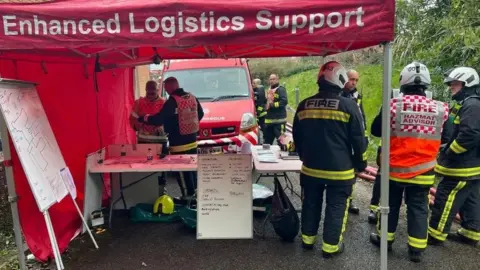
Deputy Chief Fire Officer Nick Searle, who is the NFCC’s national resilience lead, added: “This scoping work is ongoing and will be completed this year. Some national assets have alreadybeen replaced this year as part of the replacement strategy.
“Notwithstanding the responsibilities taken nationally – all fire and rescue services are required to put in plans to deal with all foreseeable risk.”
Kit replaced so far includes chemical, biological, radiological and nuclear (CBRN) detection vehicles and support equipment.
But firefighters are concerned that the 52 high-volume pumps used to deal with flooding and wildfires have yet to be upgraded or replaced.
Matt Wrack, the general secretary of the FBU, said that in recent years firefighters had been “pushed beyond their limits responding to severe floods and wildfires” due to cuts to staff numbers and funding.
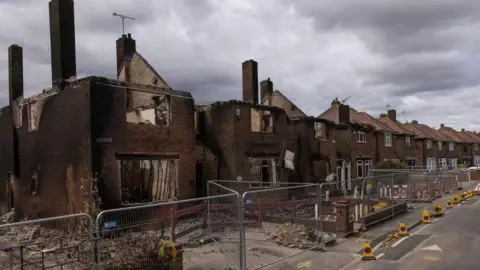
“Renewing New Dimension assets is urgent but won’t undo the damage of austerity, or the wider lack of national coordination.
“To face these growing risks, resources must be reviewed and expanded to ensure the fire service is prepared. We cannot wait until the next crisis hits.”
A Home Office spokesperson said the government had an ongoing programme reviewing and updating national resilience specialist assets “to ensure that services have the resources they need to keep the public safe and save lives”.
That review is currently looking at what is needed to replace or upgrade the high-volume pumps, as well as mass decontamination units, to determine the overall costs of the New Dimension project.
She added: “Overall, fire and rescue authorities will receive around £2.87bn in 2024/25. Decisions on how their resources are best deployed are a matter for individual authorities.”
A Labour Party spokesperson said: “We’ll look at the findings of the Home Office review and work with our brilliant fire and rescue service to ensure they have the equipment they need.”





